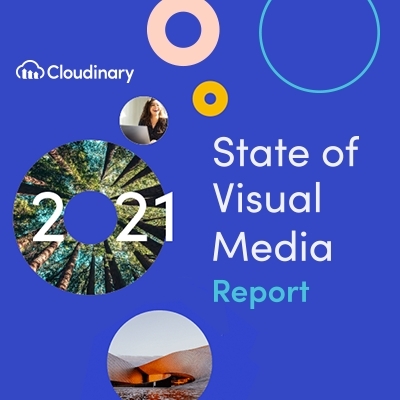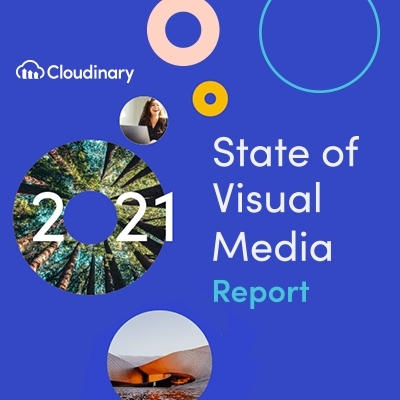SANTA CLARA, Calif.--(BUSINESS WIRE)--Cloudinary, the media experience platform for many of the world’s top brands, today launched its third State of Visual Media report*. The report, which analyzed data from more than 670 global customer brands, revealed a substantial increase in images and video content publishing during the pandemic. For example, video views nearly doubled and video bandwidth grew almost 140% in Q2 2020, when the pandemic first began. At the same time, brands are just scratching the surface when it comes to harnessing the power of new approaches like applying AI, using next-gen image and video formats, and optimizing visual media for private messaging, or “microbrowser” environments.
Key findings from the 2021 State of Visual Media Report include:
- Pandemic-fueled video growth also revealed new use cases. In addition to the dramatic rise in video, Cloudinary also saw brands pioneering creative and novel use cases, such as videos delivered to Internet of Things (IoT) devices.
- The modern web is driving modern format adoption. Most brands use three or four different image formats (32.5% and 28.6% respectively). While JPEG (95%) and PNG (73%) are still the leading image formats, newer formats like WebP (69%) are catching up quickly.
- Mobile-first responsiveness is a must. Between December 2019 and April 2021, mobile devices generated 51.4% of traffic, with significant regional differences worth noting. Germany, India, the U.K. and the U.S. represented a wide range of mobile traffic bandwidth, from 48% in the U.S. to 81% in India. Most brands within our data set are on top of this trend.
- Use of AI automation, while increasingly popular, is at an early stage of maturity. Brands used automated media manipulations extensively to shine in today’s visual economy, with the top five transformations related to resizing, quality compression, format selection, responsive delivery and smart cropping. More advanced transformations and AI-based add-ons have been adopted by industries like media and publishing, but are still making their way into mainstream adoption.
“Our extensive data tells a clear story that visual media usage continues to grow and was influenced greatly by the pandemic,” said Tal Lev-Ami, co-founder and CTO, Cloudinary. “However, it also shows that brands in all industries stand to benefit by taking advantage of new tools and technologies to optimize images and video and deliver exceptional ‘visual-first’ user experiences. As we gradually return to a new post-pandemic reality, fast and flawless visual content will remain critically important for communication and commerce alike.”
Brands can learn from forerunners in ‘visual literacy’ by reading the case studies and tips in the report, now available here and by learning from leading brands such as Apartment Therapy, Lastminute.com, Minted and Mediavine at Cloudinary’s free, virtual ImageCon conference next month October 19-20, 2021.
* Methodology
The data analyzed for Cloudinary’s State of Visual Media report comprises engagement patterns during December 2019 through April of 2021 across more than 670 Cloudinary customers, spanning more than a dozen vertical industries and a representative sampling of over 80 billion transactions per month.
About Cloudinary
Cloudinary’s mission is to empower companies to deliver visual experiences that inspire and connect by unleashing the full potential of their media. With more than 50 billion assets under management and more than 8,000 customers worldwide, Cloudinary is the industry standard for developers, creators and marketers looking to upload, store, transform, manage, and deliver images and videos online. As a result, leading brands like Atlassian, Bleacher Report, Bombas, Grubhub, Hinge, NBC, Mediavine, Peloton, Petco and Under Armour are seeing significant business value in using Cloudinary, including faster time to market, higher user satisfaction and increased engagement and conversions. For more information, visit www.cloudinary.com.




